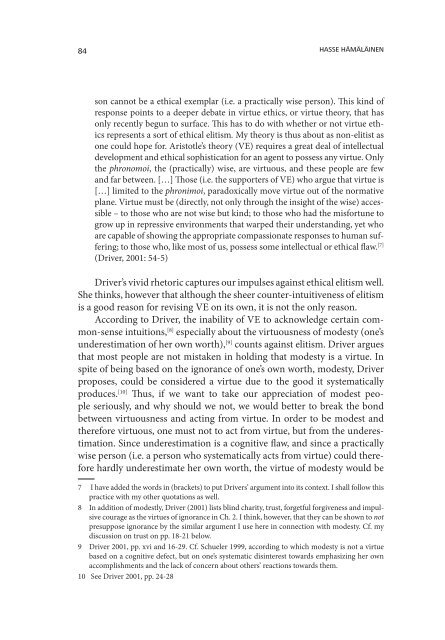Diacritica 25-2_Filosofia.indb - cehum - Universidade do Minho
Diacritica 25-2_Filosofia.indb - cehum - Universidade do Minho
Diacritica 25-2_Filosofia.indb - cehum - Universidade do Minho
Create successful ePaper yourself
Turn your PDF publications into a flip-book with our unique Google optimized e-Paper software.
84<br />
HASSE HÄMÄLÄINEN<br />
son cannot be a ethical exemplar (i.e. a practically wise person). Th is kind of<br />
response points to a deeper debate in virtue ethics, or virtue theory, that has<br />
only recently begun to surface. Th is has to <strong>do</strong> with whether or not virtue ethics<br />
represents a sort of ethical elitism. My theory is thus about as non-elitist as<br />
one could hope for. Aristotle’s theory (VE) requires a great deal of intellectual<br />
development and ethical sophistication for an agent to possess any virtue. Only<br />
the phronomoi, the (practically) wise, are virtuous, and these people are few<br />
and far between. […] Th ose (i.e. the supporters of VE) who argue that virtue is<br />
[…] limited to the phronimoi, para<strong>do</strong>xically move virtue out of the normative<br />
plane. Virtue must be (directly, not only through the insight of the wise) accessible<br />
– to those who are not wise but kind; to those who had the misfortune to<br />
grow up in repressive environments that warped their understanding, yet who<br />
are capable of showing the appropriate compassionate responses to human suffering;<br />
to those who, like most of us, possess some intellectual or ethical fl aw. [7]<br />
(Driver, 2001: 54-5)<br />
Driver’s vivid rhetoric captures our impulses against ethical elitism well.<br />
She thinks, however that although the sheer counter-intuitiveness of elitism<br />
is a good reason for revising VE on its own, it is not the only reason.<br />
According to Driver, the inability of VE to acknowledge certain common-sense<br />
intuitions, [8] especially about the virtuousness of modesty (one’s<br />
underestimation of her own worth), [9] counts against elitism. Driver argues<br />
that most people are not mistaken in holding that modesty is a virtue. In<br />
spite of being based on the ignorance of one’s own worth, modesty, Driver<br />
proposes, could be considered a virtue due to the good it systematically<br />
produces. [10] Th us, if we want to take our appreciation of modest people<br />
seriously, and why should we not, we would better to break the bond<br />
between virtuousness and acting from virtue. In order to be modest and<br />
therefore virtuous, one must not to act from virtue, but from the underestimation.<br />
Since underestimation is a cognitive fl aw, and since a practically<br />
wise person (i.e. a person who systematically acts from virtue) could therefore<br />
hardly underestimate her own worth, the virtue of modesty would be<br />
7 I have added the words in (brackets) to put Drivers’ argument into its context. I shall follow this<br />
practice with my other quotations as well.<br />
8 In addition of modestly, Driver (2001) lists blind charity, trust, forgetful forgiveness and impulsive<br />
courage as the virtues of ignorance in Ch. 2. I think, however, that they can be shown to not<br />
presuppose ignorance by the similar argument I use here in connection with modesty. Cf. my<br />
discussion on trust on pp. 18-21 below.<br />
9 Driver 2001, pp. xvi and 16-29. Cf. Schueler 1999, according to which modesty is not a virtue<br />
based on a cognitive defect, but on one’s systematic disinterest towards emphasizing her own<br />
accomplishments and the lack of concern about others’ reactions towards them.<br />
10 See Driver 2001, pp. 24-28<br />
<strong>Diacritica</strong> <strong>25</strong>-2_<strong>Filosofia</strong>.<strong>indb</strong> 84 05-01-2012 09:38:22











![Programa [pdf] - cehum - Universidade do Minho](https://img.yumpu.com/17305425/1/190x135/programa-pdf-cehum-universidade-do-minho.jpg?quality=85)




